Spooky season is in full effect, readers; All Hallows’ Eve fast approaches, and with it have come waves of new series exploring the dark, the forgotten, and the tragic in our world and in our culture. In this serving, let’s explore some of these new series, beginning with Alfonso Cuarón’s latest venture, but let’s not forget the light in the few softer streaming premieres since last we met, including the return of a classic sitcom. and the début of a ‘clever’ satire.
Wishing you all a dutifully spooky Halloween! 🎃
Disclaimer (Series Premiere)
Apple TV+ • Drama • Proof
Synopsis
A respected filmmaker’s indiscreet past frays her reputation when a document surfaces twenty years later.
My take
Readers, it behooves me to say — in the way of my own opening disclaimer here — that I don’t think I’m the target audience for this adaptation of Renée Knight’s (2015) novel about grief, secrets, and betrayal. Yes, one of our favorite filmmakers, four-time Rich Pick and four-time Oscar winner Alfonso Cuarón, is the adaptor; but, honestly, his writing this time around transparently rests all too heavily on the self-indulgent presumption that there is but one common (and, dare I say, ‘moral’) perspective on the events of the plot — when for me at least there certainly is not. Without diving straight into the details for a moment, I’ll say in fair advanced warning, readers, that such a fundamental disconnect was a signal to me from the very first episode of this new series that Disclaimer was made for just one particular audience in mind and that, unless you belong to that audience, you too will miss the dramatic resonance with its messages, its milestones, and its themes. What do I mean exactly? Well, let’s set the stage a bit more.
It’s no secret that Disclaimer’s expectations were among the highest we’ve seen in recent memory. With a pedigree of A-listers in all domains at work on the project — including:
Rich Pick, Oscar winner, and Tony and Emmy nominee Cate Blanchett in lead;
Rich Pick nominees and Oscar nominees Sacha Baron Cohen, Kodi Smit-McPhee, Lesley Manville, and Kevin Kline1 in support;
Rich Picks and respective Oscar nominee and winner Bruno Delbonnel and Emmanuel Lubezki both behind the camera;
Rich Pick and Oscar and Grammy winner Finneas o’Connell on score; and,
again, Rich Pick and Oscar winner Alfonso Cuarón on the page and at the helm
— the series could hardly have been expected to go seriously wrong in almost any way.
And — to the series’ credit — watching even just the first episode alone, I believe, would make anyone admit to the technical mastery at work in all those aforementioned aspects of Disclaimer: Acting, directing, and music are all world-class technicians; and the cinematography in particular is just stunning, somehow both:
rightly making the elite sophisticate new London home of Blanchett’s celebrated documentarian Catherine and her quietly discontented husband (played by Baron Cohen) feel every bit the emotionally and physically cramped and tedious space it needs to be as the external diegetic expressions of those characters’ shared internal world, and
at the same time rightly letting the glimmering sun-kissed memories of Italy bloom wide with warmth, intimacy, and possibility.
This play between the ironically cold interiors of familiars in the present and the equally ironically warm novelty of strangers in the past sets up the dialectic motif the series carries forward as all its elected visual terms of art. Characters are never so at ease now with their actual families as they are with alone or with utter strangers, and never so happy with themselves now as they used to be when times were simpler in the long-shadowed past. If only the creators had rested this clever mechanical dialectic upon a sturdier foundation than the one they gave it, we might have enjoyed a transcendent majesty (or at least a painterly elegance) in the whole thing, winsomely saturated as it is with immersive tragedy like a delicate watercolor prized within a private collection. It wouldn’t have been to everyone’s taste, no; but it would have been so much more sturdily compelling than it ever is now.
So, what is the problem I have with Disclaimer? In short, readers, it’s that, despite the masters at work on the final product, the fundamental stakes for the characters seem inescapably and overwhelmingly out of proportion, both with each other and with what actually took place in their shared histories and internal and external worlds. Episode 1 I found myself asking aloud to no one in particular, “Why would Baron Cohen’s character care so freaking much about — spoiler alert — a minor one-night affair his wife *may* have indulged in like twenty years ago on a vacation in Italy?” I mean, even if the affair actually did take place in any real physical way, it wouldn’t call into question his paternity of their only child, nor has it seemingly ever had any real impact on the more than twenty years of at least superficially functional and supportive marriage he’s enjoyed with Catherine both before and since. I mean, sure, she did lie and “duplicitously conceal” a momentary act of sexual infidelity from her husband rather than expurgate herself of any such perceived secret crime or related guilt by voluntarily confessing the breach to him at any other point during their marriage; assuming that such conduct would indeed violate the terms of their relationship, I fully get that her actions are “bad” and warrant a serious discussion about trust and honesty with him, plus time, in order to fully heal. Even so, where is his cause for imploding like a dying star over that single long-past discretion? Why is he acting as if he can no longer accomplice himself to a hardened criminal whose own past speaks lamentably for itself? Why is he so quick to turn on a wife whom we first see him actively supporting and congratulating on her professional achievements? From that early support to barely tolerating a conversation? From that synchrony to storming away silently into the night and leaving his wife crying and pleading to be heard alone in the street? Twenty years of apparently blissful union and not even the benefit of the doubt? Not even one single conversation?! Again, I’m pretty sure I’m just not starting on the same page as the audience Cuarón imagined here, but after twenty-plus years of marriage I think I’d at least hear my spouse out about a relatively ancient infraction before dramatically pulling the plug on all communication … and for me, readers, the whole thread of the series just completely unspools from there.
Utterly unconvinced of the events in Disclaimer, I’ve been clinging to the only two possibilities that could help me save my impression of it: (1) the likelihood of the unreliable narrator and (2) the possibility of something more being wrong in the characters’ histories than what we’re so far granted privy to. And, even though the chance that those possibilities seamlessly redeem the entirety of this limited series in its very last episode is next to nil, I have to cling to them — because otherwise, readers, we’re just submitting to the consequences of a premise Cuarón and his crew just believe they’ve soundly constructed; or, in other words, readers, because Cuarón has otherwise just provided us a modern setting for a tonally identical retelling of Hawthorne’s (1850) The Scarlet Letter wherein we the audience are involuntarily conscripted into the townspeople baying for his leading lady’s adulterous blood like hounds starved for a meal specifically condemning female sexuality and self-expression…
At least seeing the series through to its conclusion will mean living in the light of some of the best cinematography on television I’ve ever seen; but ultimately I won’t be meeting my own standards here, if despite the endless scroll of accolades the creators of Disclaimer have deservedly accrued for their past works I gave this new series any more enthusiastic a reading than:
Temperature check
Cold
Agatha All Along (Series Premiere)
Disney+ • Fantasy • Coven Garden
Synopsis
In search of ammunition, a witch cajoles a motley coven into a mythical trial of skill.
My take
After the abject failure of Hocus Pocus 2, Disney+’s last Halloween venture into sequel nostalgia, (Fletcher [dir.] & d’Angelo [wri.], 2022) my hopes were admittedly reserved for this new series to follow the success of WandaVision (Schaeffer [creator], 2021) into another wiccan ever after. However, after its premiere few episodes, I felt confident enough to say that Agatha All Along, thanks especially to the winking performance of its lead actress and a delightful supporting turn from Patti Lupone, delivers on its tastefully lighthearted premise with its own unique brand of magical camp, pitched in the woods of adolescent drama.
A fairy tale, without the fairies, the series poses no adult questions; for every character, maturing into an adult person capable of grief, companionship, trust, and community is the crisis under examination in the story. This perspective, in my experience, places it squarely within the greater Marvel Universe, wherein unexpected bodily changes, hidden ambitions, and cataclysmic fractures from the reality of the world are the de rigueur conflicts motivating the full spectrum of its signature action-packed dramas. So, although this new series concentrates around a nearly all-female cast with decidedly queer appeal, make no mistake, readers: The work here is cut from the same cloth.
And, true to that ascendancy, where Agatha All Along shines brightest is not in its writing, nor its music, nor its acting; but rather in its visual environments. Sets, costumes, and make-up here are the major wins, especially given how important they become to the story. Contextualizing trials of identity and skill tailor-made to fit each character and running the gamut from Martha Stewart Living (see the image above) to 1970s punk recording studio, in addition to dressing the supernatural forest of our characters’ literal and metaphorical journey, the built environment is the primary reason you should tune into this series. That Disney+Marvel money, honey — it shows.
Temperature check
Tepid
American Sports Story: Aaron Hernández (Series Premiere)
Hulu / FX • True Crime • Catching Heat
Synopsis
Pressures to achieve through conformity with what others expect of him push an otherwise promising athlete beyond the point of no return.
My take
A clean pass straight down the middle of the field makes perhaps the most it could, of Ryan Murphy’s on-going fascination with both the queer and the dark elements in our culture. Taking no chances but relating its story with gravitas competently, American Sports Story: Aaron Hernandez is a ‘safe’ new chapter in Murphy’s catalogue, asking clearly whether queerness and darkness have been sufficiently extricated from each other enough yet in our culture to prevent tragedies like the real history upon which this adapted series is based from recurring in the future — a worthwhile question, no doubt, and one that hasn’t actually been asked well enough elsewhere, including in its nearest sociocultural relatives: the grating Coming Out Colton (2021; see my take here) and Murphy’s own previous attempts at similar ventures, especially American Crime Story: The Assassination of Gianni Versace (2018) and the surprisingly brilliant Dahmer – Monster: The Jeffrey Dahmer Story (2022).
While this notable addition to queer discourse in conjunction with horror substantiates this new series in its foundation, in its final expression the camerawork, editing, and pacing find no inventiveness beyond the myriad other ‘true crime’ narratives we’re all quite familiar with already. Perhaps taking cues most evidently from the construction of the independent feature that cost Annette Bening her Oscar (i.e., Boys Don’t Cry [Peirce (dir./wri.) & Bienen (wri.), 1999]), this American Sports Story leans all its interests on the centrality of its leading performance, from relative newcomer Josh Andrés Rivera, whose application here is complete, to be sure, but fails to go beyond the printed lines of the page, toward making his character not just true to the story he holds together but moreover fully three-dimensional: more than just a casualty of the cold social war between deeply entrenched homophobia and mainstream applause, especially in aggressively ‘masculine’ popular arenas like major league sports.
All in all, while nothing is ‘wrong’ per se with this series, nothing is so ‘right’ either that it burns off the screen the way some few of its cousins have.
Temperature check
Tepid
Heartstopper (Season 3)
Netflix • Romance • Baggage
Synopsis
Adolescent couples perseverate on the individual struggles their members each have with control over the increasingly broadened horizons around them.
My take
Piners for adolescent queer utopian escapism, no doubt, are celebrating the return of this twee series, centrally narrating the budding romance between a nerdy unpopular high school student (now struggling with anorexia nervosa) and his golden-retriever boyfriend (now struggling to support someone with anorexia nervosa). However, as of last season, this series lost all the quirky curious magic it once had, in the heydays of its still only moderate début season (see my original take on Season 1 here and on Season 2 here). The characters now feel set on ‘persistent tumble-dry’ and, while I suppose that I should celebrate a thorough enough continuity of storyline that doesn’t opportunize hiatus between seasons as a chance to completely wipe the slate and start afresh, the carried-over plot lines from Heartstopper’s second season feel annoyingly insoluble when handled with such simultaneously slow and delicate tones. Perhaps this tonality is the mistaken result of immersive, empathetic storytelling gone awry; rather than empathize with the difficulties the central character Charlie and his circle of friends each contends with this season, I found myself empathizing instead with the grating frustration especially Charlie exudes whenever the other characters try haplessly to discuss those difficulties with him o so softly. The timidity in general is infuriatingly off the charts, except in the only redeeming storyline of the season: the thankfully exposed and expanded asexual and aromantic identity of Charlie’s friend Isaac (shown on the right above). That relatively minor plot line, in my opinion, is the only seriously empowering and vulnerable exploration to which this otherwise treacly tranquilizer to queer teen romance gives light.
Temperature check
Cold
Inside Out 2 (2024)
Disney+ • Adventure • High-Piled Anxiety
Synopsis
Continued emotional development rattles a thirteen-year-old hockey player and her internal cast of core emotions.
My take
Gorgeous segments of production design and glimmering (but fleeting) moments of interesting ideas cannot salvage this underbaked near-catastrophe of the franchise-monetization machine for Disney-Pixar HQ. Overconditioned on a singularity of emotional pretext without embracing the sweeping symphony of complex feelings emotion science recognizes the human condition embodies, Inside Out 2 cut its own corners, presumably in sacrifice for a “scoped” and realizable animated feature, without looking out for the vital and coherent connections those corners contained as reservoirs of pluripotent storytelling about the compellingly human experience it purports to portray.
Protagonist Riley is very much the ‘every-teen,’ uncertain about her worth especially in the eyes of admired peers and parents but naïvely confident enough to try even tall challenges — at least to ascertain her limits. Anxiety unsurprisingly plays an important and sometimes even central role in the dynamics of that uncertain-but-confident duality. However, conspicuously missing are anxiety’s nearest emotional relatives (e.g., pride, trust, courage) and their own often beneficial outcomes (e.g., safety, security) from the complete landscape of that adolescent spectrum in Pixar’s colorful allegory. Concentrating almost exclusively on the costly dimensions of what science has sometimes called “the social emotions” shortchanges the potent relatability the original Inside Out (Docter [dir./wri.], LeFauve, Cooley, & del Carmen [wri.], 2015) enjoyed. Moreover, missing that relatability betrays the legacy that original feature created in our culture, as a near-perfect marriage of conventional storytelling and scientific understanding, and sacrifices the success of its own narrative by reducing even the highly complex human feelings that do appear to quasi-comedic sketches of their individually most salient features. Yes, this result may be the intended outcome from a “minimum viable writing” (MVW) approach for the broadest audience, but therein lies the problem: MVW is only as deep and powerful a vehicle for understanding of the subtle euphoria of the human experience as any tabloid headline. Ultimately, the greatest disappointment here is exactly that revealed standard: Inasmuch for its audiences as for its studio(s) Inside Out 2 is little more than gold rush, hopped upon the dream of capitalizing on the once fortunate find visitors fondly remember from the same area.
Temperature check
Cold (brr)
Grotesquerie (Series Premiere)
Hulu / FX • Horror • Christian Coded
Synopsis
A string of elaborate, religiously toned murders confuses a shrewd but alcoholic detective and the chipper if overly curious nun eager to help her.
My take
In a culture in which religious — specifically Christian — ideology still looms large in the casting of spectral shadows on bedroom walls, or in which a horror franchise about a demonic nun (e.g., The Nun [Hardy (dir.) & Dauberman (wri.), 2018]) — itself a parochial spin-off branch in a cinematic universe about contra-Christian demonic activity (see James Wan’s The Conjuring universe) — has achieved enough financial and critical success to motivate a sequel, it’s unsurprising that a television series focussing on the diabolically Catholic perspectives on gruesome murders finds itself a place on our screens, especially at this time of year. While I hold no ill will against Ryan Murphy and team for bringing it to us — if anyone’s, it’s his résumé on contemporary episodic horror that is loudest and longest — I do wonder whether he stopped to think enough about the details of this particular addition to his past works, to make sure that it came away with the now expected ‘Ryan Murphy’ feel. Whatever you think of the man and the impression he’s clearly left on our culture, especially seasonally every year since 2011 at this time, each entirely new premiere he delivers exudes a magnetic charm that invites audiences to share in the experiences of the characters in focus, however desperate or eccentric they may be, from high school misfits to literal poltergeists and everything in between. Here however, that charm is hard to discern. Niecy Nash-Betts, an extremely worthy Emmy award winner for her last collaboration with Murphy, gives us a human, yes, but inscrutable lead, whose tensions with her daughter inspire more interest than her pacing around crime scenes or disputes with medical staff (however nice it may be to see Rich Pick nominee and Oscar nominee Lesley Manville again this serving on television). Micaela Diamond, as Nash-Betts’ investigative if devout sparring partner, brings the only light into the series and, while that light is charming in its own way, it doesn’t extend to kindle any similar charm in the rest of the series, which in perhaps only its practically grounded and theatrically religious flavor differs just enough from its American Horror Story relatives to merit its distinct umbrella title. Rather than share in the experiences of these characters, we act as the receiving audiences for their quasi-fourth-wall-breaking expositive monologues; rather than participants drawn into the aptly named grotesquerie, we are observants noticing its outlines from beyond the thick glass.
I fully admit to being slightly behind the current slate of this series’ available episodes as of the date of this serving’s publication, so perhaps there is a reason to the removal behind glass, as I put it, I have yet to receive and incorporate into my perspective. If so, I’ll happily respect the twist and revise my take here in a future addendum. If not, however, and the series continues to plane away in its described manner, then I’d recommend seeking out this Grotesquerie only as much as you still crave additional spooky content afore this year’s All Hallows’ Eve.
Temperature check
Cold
Frasier (Season 2)
Paramount+ • Comedy • Scrambled Eggs
Synopsis
An eminent psychotherapist flails in his own vices and shortcomings despite attempts to strengthen his bonds with his family members and friends.
My take
Readers, I was so viscerally disappointed with the return of one of my all-time favorite television series, that I didn’t even give Frasier (2023) the dignity of a take here on Rich Reviews, when it premiered on Paramount+ last year. A flimsy mess, this “new” Frasier’s début season was a smear on the face of a great comic legacy, whose intelligent writing and complementary acting fueled a celebrated eleven-season run on a mainstream network and earned 37 total Primetime Emmy Awards while disabusing an entire industry of the notion that a spin-off from a monocultural series could never be both a popular and critical success in its own right.
In its second season — an almost unbelievably earned continuation of that first season’s tragic existence — I am allayed to say, it’s not quite so bad as I’d feared it would be. Yes, the creaky, phony, sound-staged tone to the “comedy” is just as groanworthy now as it was in the first season; but not all the episodes labor like the forced hand of robotic piano player. We even get to see some beloved favorites from the original series make their flamboyant returns into Frasier’s life.
And, while, yes, that rallying cry was about as nourishing as scrounging for crumbs off the abandoned plate of a forgotten customer, I confess I did laugh aloud in relief and joy over one episode this season wherein the old dedicated repartée the original series cut like d’Artagnan briefly returned to swash us right through our buckles. For that mere glimmer of hope alone that this rebooted series may not wallow into the dirt of all the other cheap shots at comic comebacks (e.g., Murphy Brown [2018; English (creator)], Will & Grace [2017-2020; Kohan & Mutchnick (creators)]), the season earns itself the smallest dint of my approval.
Temperature check
Cold
It’s What’s Inside (2024)
Netflix • Thriller • Corpora ad Corpora, Ossa ad Ossa
Synopsis
A long-awaited gathering prompts covetous exchanges among eight friends.
My take
Move over, Bodies Bodies Bodies (Reijn [dir.], deLappe, & Roupenian [wri.], 2022); another investigation of youthful mayhem and — spoiler alert — gradual in-fighting over the course of one night in a large expensive house has entered the culture. Not quite as supernatural as Ready or Not (Bettinelli-Olpin, Gillett [dir.], Busick, & Murphy [wri.], 2019), nor quite as zany as Clue (Lynn [dir./wri.] & Landis [wri.], 1985), this latest entry into the emergently defined “it happened one night” sub-subgenre of thriller plays from a science-fiction angle, taking its characters “through the looking glass” not by means of demonic devices, financial complications, or reputation-based entrapments but rather by technology. No, however, no, this isn’t quite just another Black Mirror (Brooker [creator], 2011-present) cousin elaborated; while technology here is the catalyst, there isn’t the same precautious wonderment about a viable extension of our modern capabilities at stake in this ensemble fable. In reality, much less than the wisdom around possible futures is in question here, so we can save ourselves the pressure to either condemn or extol human judgment and choice in this extenuated circumstance. However, there isn’t a vacuum here either; it seems, the purpose behind the writing is much more intensely focussed on conversations around responsibility and maturity than any of tis nearest cultural relatives has been. Then an allegory of sorts around the current state of socioeconomic success and distress in our culture, It’s What’s Inside even by its title calls out the pretense on which our Western, or at the very least American, sensibilities construct every relationship we openly intend to have. Unsurprisingly, diegetic irony surfaces.
Ultimately, It’s What’s Inside gets too lost in the minutia of its characters’ baggage and interactions, drawn out over the course of their nightly game, to make the best use of its embedded allegory. Ripening fruit lingers too long on the vine, and by the time it comes to plucking it the film has frittered away too much time on the trippy nonsense around the gathering to leave resolving the allegory much impact. In this way more an occasionally pensive teenaged drama — the kind you’d see among posters for Teen Wolf (Davis [dev.], 2011-2017) and Ridiculousness (Nickerson, Hoover, Tremaine, & Dyrdek [creators], 2011-present) in the hallways of MTV — than a sharpened criticism of lackadaisical American paths from adolescent dependency to adult independence, the film is proudly a bold work designed more to impress its audience with entertainment than inspire a real conversation with its members about selflessness, integrity, and transparency in our digital age.
Temperature check
Tepid (just barely)
The Franchise (Series Premiere)
Max • Comedy • “Action!”
Synopsis
Behind the scenes of a major motion picture an anesthetized first assistant director corrals and concedes to a random assortment of actors, producers, writers, and film crew members all of whom must believe they can overrule him.
My take
Richard E. Grant triumphs in this rockslide of an inside-Hollywood satire, set “behind the scenes” of a major studio’s filming the next installment in a popular but comically insubstantial effects-driven sci-fi action series. So clearly then a wry send-up of the production efforts behind the many Marvel and even DC comic-to-film adaptations, The Franchise metes out the sublime incredulity Veep (Iannucci [creator], 2012-2019) enjoyed in its characters’ blank expressions of stunned exasperation with socially fractious demands with the compelling centrality of a protagonist so disenfranchised from his own mettle that even the smallest tasks ultimately require another’s prior approval. For me at least, this central but subtle diametrical shift redeems the series comedically from the dismal graveyard into which I always put Veep, whose awkward nonplussed dilated tensions I never understood others’ seeing as actually funny. While nothing in The Franchise so far hits nearly as hard as Richard E. Grant’s Emmy-worthy performance, the general irreverence in this dry ensemble comedy makes a fine diversion, particularly from the otherwise primarily spooky slate of currently streaming media.
Temperature check
Tepid
Kline is the only Oscar winner here in support.

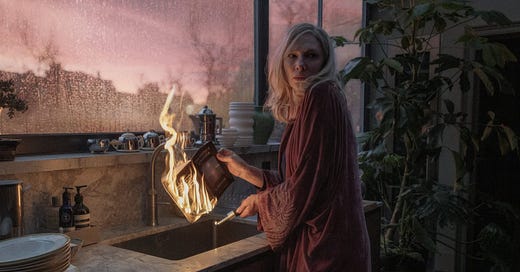



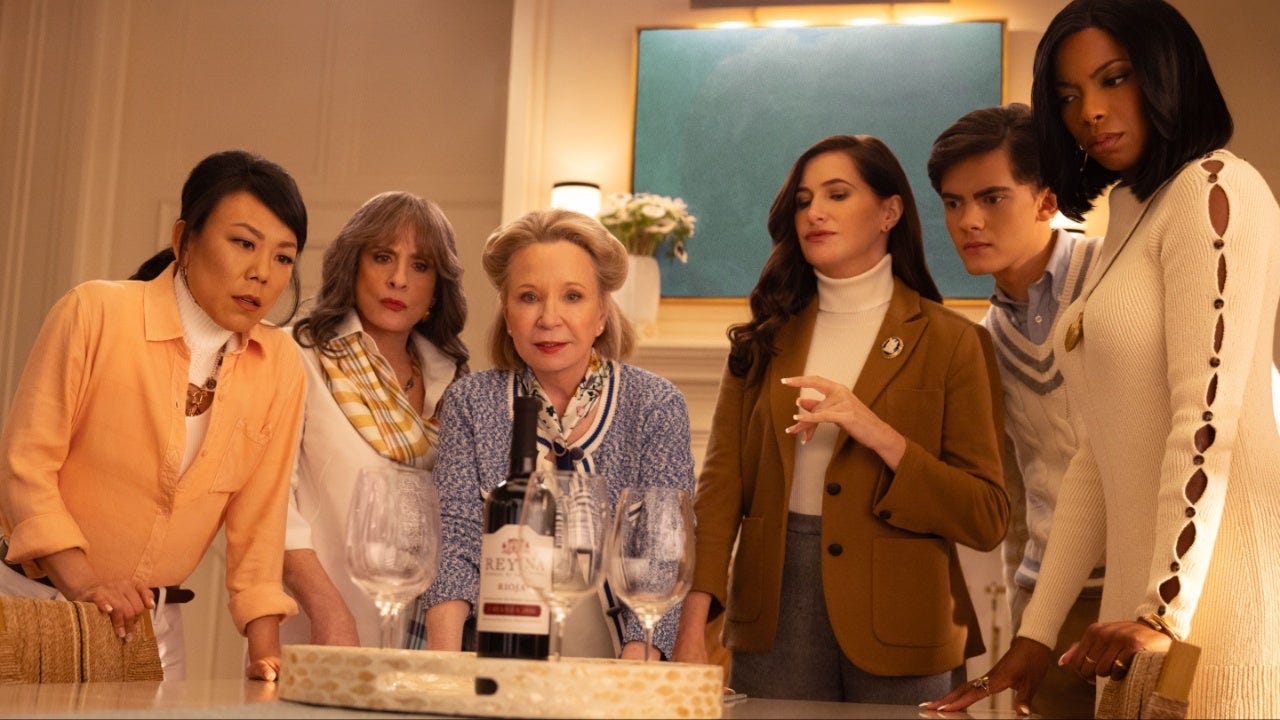
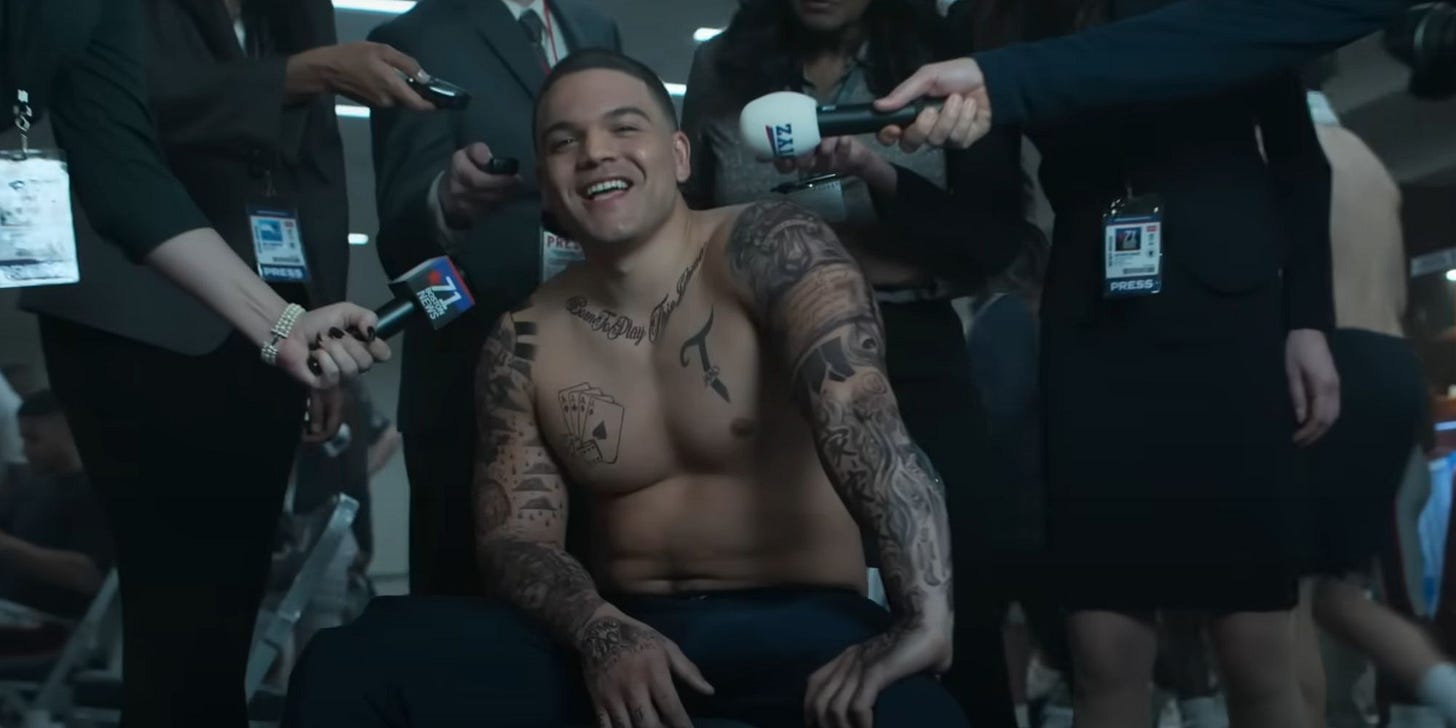
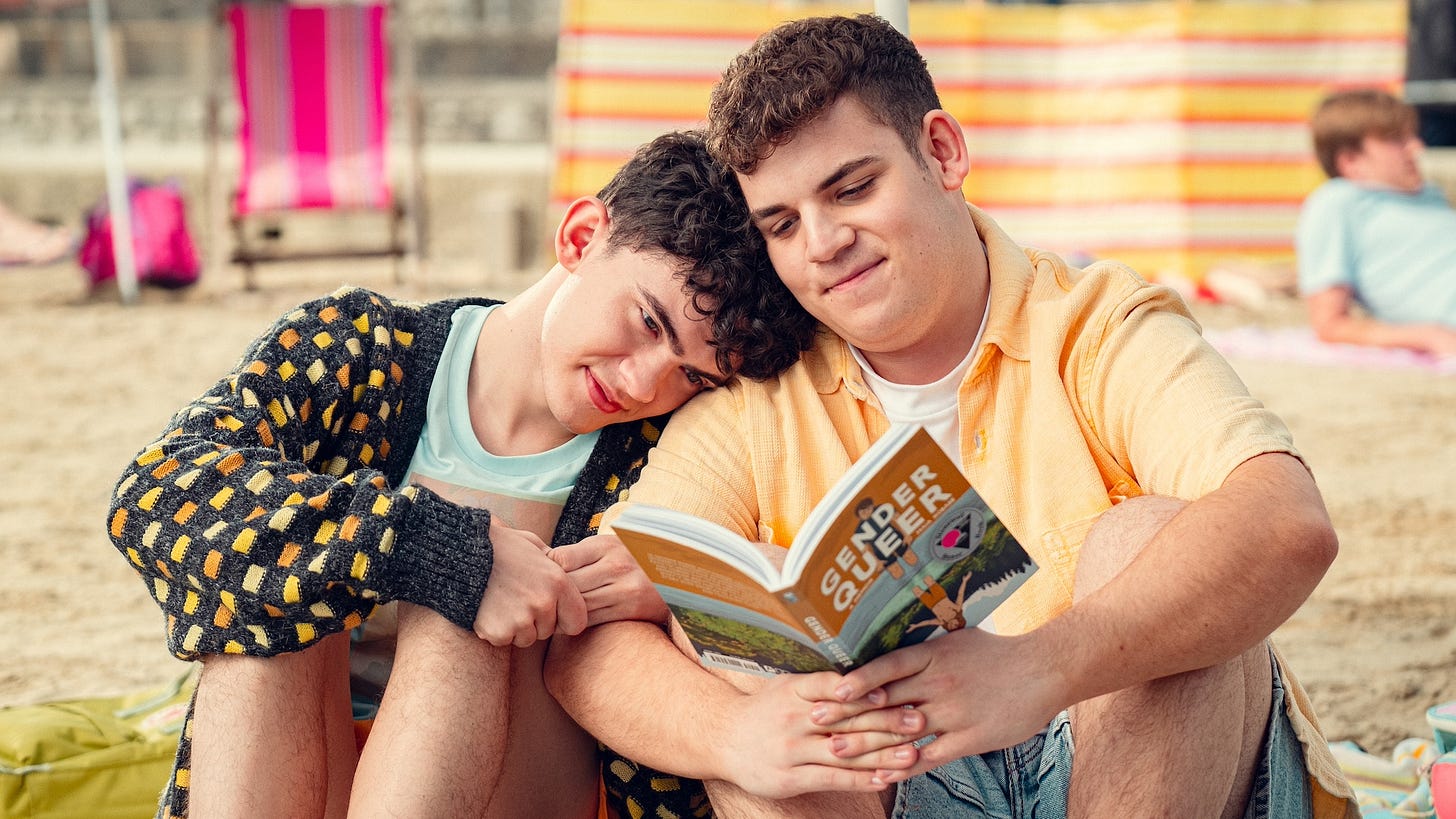
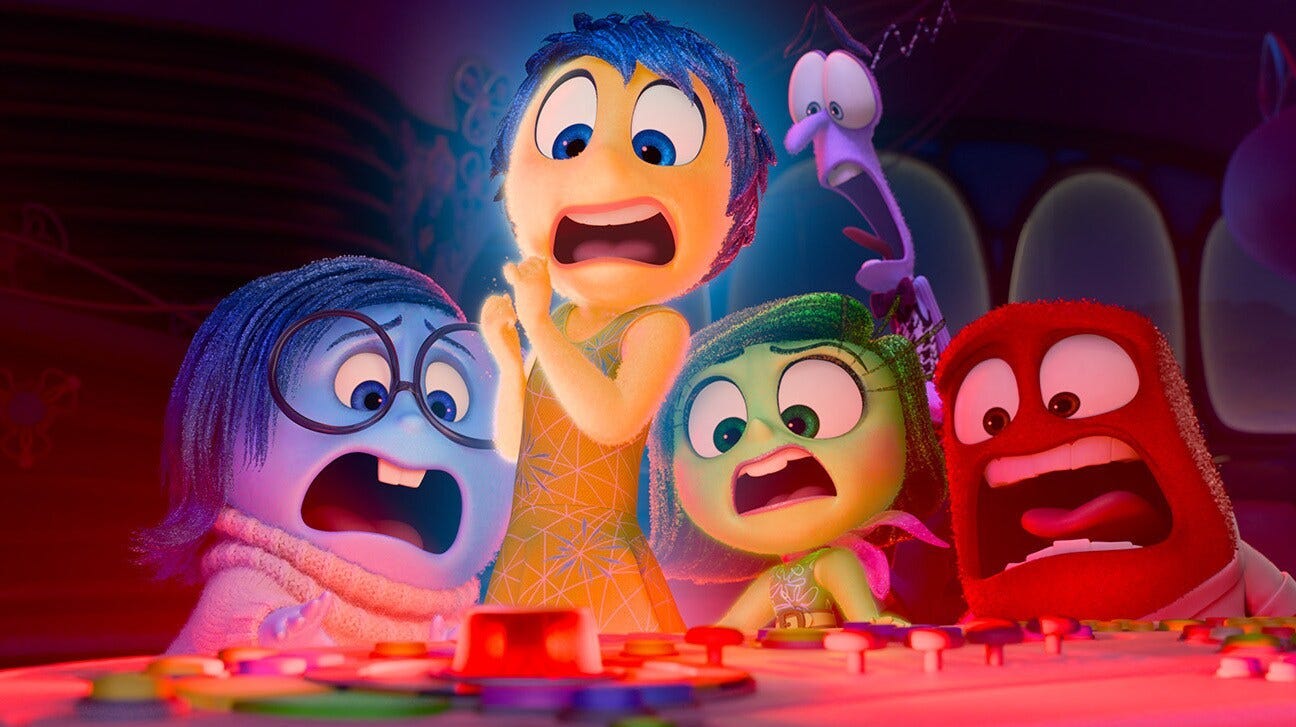




Nothing can warm this tea up, not even tossed salad and scrambled eggs! Perhaps this is an edition of the Substack “Cold Tea”
"I didn't dislike [them], I just didn't like [them], which is quite different." - Maggie Smith